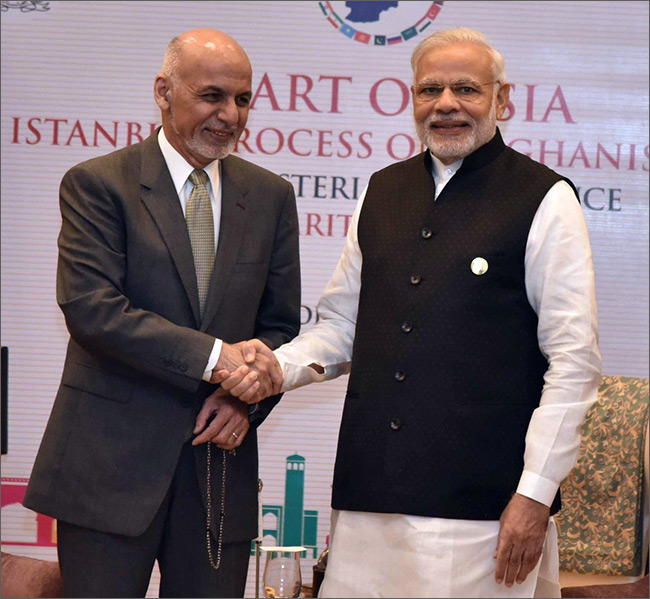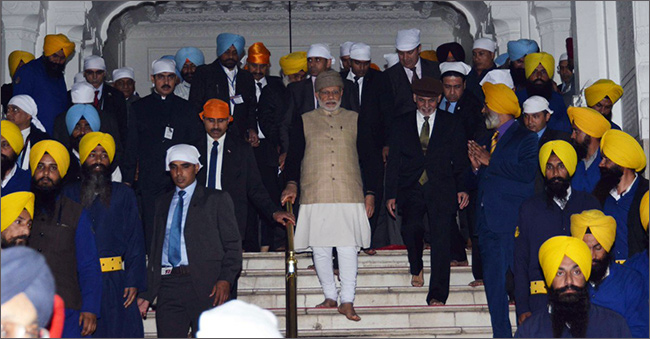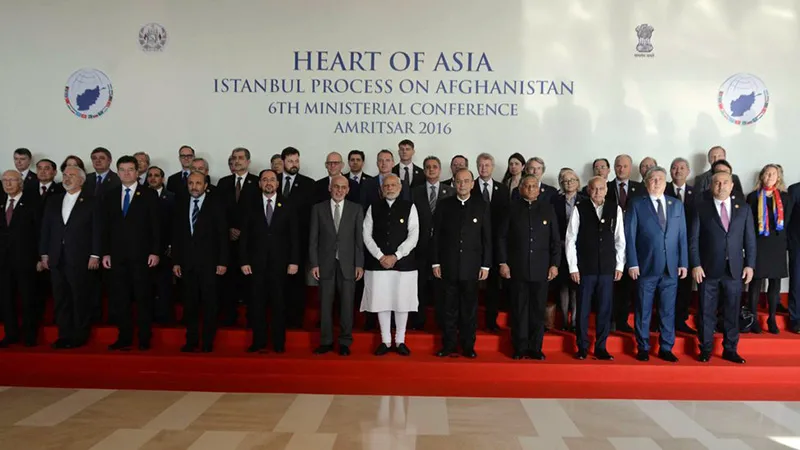In the end, as was expected, India once again managed to
isolate Pakistan at a multilateral forum – this time, at the Heart of Asia (HoA) conference in Amritsar. The two-day conference concluded on Sunday with a strong declaration, which called for concerted regional and international cooperation to ensure the elimination of terrorism as well as the dismantling of terrorist sanctuaries and safe havens in the region. It also called for disrupting all financial, tactical and logistical support for terror networks.
Without naming Pakistan, the target was clear as the Amritsar declaration said that among other terror groups propagating a “high level of violence” were “the Taliban, Daesh (Islamic State) and its affiliates, the Haqqani Network, Al Qaida ... Lashkar-e-Taiba, Jaish-e-Muhammed, Tehreek-e-Taliban Pakistan ... and other foreign terrorist fighters.”
India and Afghanistan put up a united front to pile on the pressure. Prime Minister Narendra Modi demanded “resolute action” not only against forces of terrorism, but also against “those who support, shelter, train and finance them,” underlining that terrorism and externally induced instability pose the gravest threat to Afghanistan's peace, stability and prosperity.
< style="color: #163449;">Ashraf Ghani Pulled No Punches
It was Afghan President Ashraf Ghani, once a seeming ally of Pakistan, who took the battle straight to Pakistan by directly blaming it for “launching an undeclared war” against his country, and demanded an Asian or international regime to verify Pakistan-sponsored terror operations. He also rejected the $500 million offered by Pakistan for Afghanistan’s reconstruction, asking that it be used to check extremism.
< style="color: #0069a6;">This fund, Mr Aziz, could very well be used to contain extremists because without peace, any amount of assistance will not meet the needs of our people.
< style="color: #0069a6;">Ashraf Ghani, Afghan President to Pakistan Foreign Affairs Adviser Sartaj Aziz
Faced with this onslaught, Aziz faced a difficult task in making Pakistan’s case. Asserting that it is “simplistic” to blame one country, Aziz suggested that his attending the meet despite “escalation” along the LoC was testimony to Pakistan’s “unflinching” commitment for lasting peace in Afghanistan and expressed unhappiness over the cancellation of the SAARC Summit in Islamabad in November, terming it a setback to regional cooperation.
 Source: MEAIndia
Source: MEAIndia
< style="color: #163449;">The China Factor
In a sign of a new seriousness in India’s Afghan policy, Modi offered a vision of Afghanistan as a “hub” for “strengthening links of connectivity between South Asia and Central Asia” and called for “an Afghan-led, Afghan-owned and Afghan-controlled process.”
This is another diplomatic setback for Pakistan and it is now apparent that the regional states are more united than ever in their drive to marginalise Pakistan. But it remains far from clear if Pakistan will see this as a major constraint on its behaviour. After all, it has the backing of China at the moment.
The Sino-Pak relationship is blossoming, with China poised to deploy its naval ships along with the Pakistan navy to safeguard the strategic Gwadar Port and trade routes under the $46 billion China-Pakistan Economic Corridor (CPEC). If this move goes ahead as planned, it will be the logical culmination of a long drawn Chinese involvement in Pakistan, giving the Chinese Navy a foothold in the first overseas location – the Indian Ocean and the Arabia Sea. This should not be surprising given China’s growing interest in the region and Pakistan’s eagerness to counterbalance India’s naval might.
China has always been keen on gaining a strategic toehold in the Arabian Sea, and Gwadar has been an attractive option. Despite some suggesting that China's role in Gwadar would remain limited because of mounting troubles in Baluchistan and its keenness to avoid raising hackles in New Delhi and Washington, China has now taken the plunge into the murky waters of Gwadar.
 Source: MEAIndia
Source: MEAIndia
The Gwadar Port, opened in 2007 with an initial $200 million in funding from China, had been a commercial failure because of Pakistan’s inability to use it effectively. But where in the past Beijing had repeatedly played down the significance of the Chinese role in Gwadar, many in the Pakistani establishment had gone to the extent of explicitly asking China to build a base at Gwadar.
China wants to overcome its ‘Malacca Dilemma’ as more than 80 percent of its oil imports travel through the Straits of Hormuz. Given its reluctance to rely on US naval power for unhindered access to energy, it has moved to build up its naval power at choke points along the sea routes from the Persian Gulf to the South China Sea. The Gwadar Port is central to this aim. Situated about 400 kilometres away from the Straits of Hormuz at the apex of the Arabian Sea, it is a key asset for China, especially now when China and Pakistan are busy building the nearly 3,000-km-long economic corridor linking Pakistan's Gwadar Port on the Arabian Sea with Xinjiang.
For Indian diplomacy, it will be a challenge to wean Pakistan away from China as the interests of the two nations converge in containing India. Terrorism and extremism is one area where China and India can potentially work together. After succeeding in isolating Pakistan at the 40-nation HoA conference, the Modi government will have to think more creatively to persuade China that if Pakistan’s present policies continue unabated, then Chinese interests too will suffer in the long term. Otherwise, New Delhi’s
victory in Amritsar will remain a pyrrhic one.
This commentary originally appeared in The Quint.
The views expressed above belong to the author(s). ORF research and analyses now available on Telegram! Click here to access our curated content — blogs, longforms and interviews.

 Source: MEAIndia
Source: MEAIndia Source: MEAIndia
Source: MEAIndia